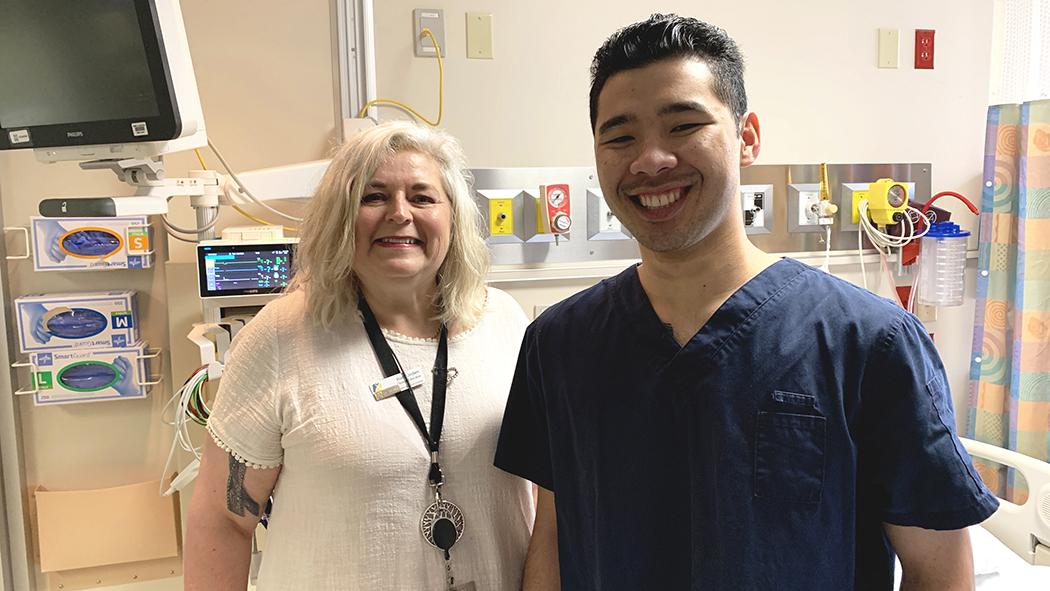
August 9, 2023
When Jack Bangcoyo came to Canada in 2019 at the age of 21, he did so for a better life for him and for his family back home.
A former nurse in the Philippines, after four years of studying, hard work and determination, he can call himself a registered nurse (RN) here, will earn more in an hour that he did back home in a day, and will generally care for four patients at a time.
“I am able to provide more holistic care to my patients because of the experiences here at LHSC and I wouldn’t have been able to do as well without the help here,” he said the day after he completed his required hands-on training, or what’s called ‘evidence of practice.’
This evidence of practice was completed through the Supervised Practice Experience Program (SPEP), which LHSC has offered in collaboration with the College of Nurses of Ontario since January 2022. The SPEP program is supported by Joan Linden, a clinical educator with Nursing Professional Practice. It is a minimum of 140 hours and provides the opportunity to demonstrate current nursing knowledge, skill and judgement and language proficiency skills.
"I support them from the beginning to the end and am in constant touch with them,” Linden says. “If they are struggling, I will be at their elbow to provide individualized supports.”
The process for internationally educated nurses wanting to become full-fledged registered nurses in Canada is a long and challenging one. Many have to essentially start over and train as a personal support worker (PSW) while they pour over paperwork trying to get an assessment of the nursing training they did in their home country and what it might be equivalent to in the Canadian system. Then there is more studying, possibly more classes and definitely more exams, often while also working to make ends meets.
When Jack first came to Canada, he enrolled in the PSW program at Fanshawe College and then worked as a live-in caregiver for about one year. After that, he worked in a long-term care home when he realized that he wanted to work in a hospital. He managed to get a position as a PSW with Clinical Neurological Services at LHSC and started on the next step in his journey to becoming a RN.
After writing an exam and participating in the SPEP for 140 hours, he qualified as a registered practical nurse (RPN). He then completed more studies, another exam and another 140 hours through the SPEP to earn his RN credentials.
“It was hard to go back and start as a PSW but it’s a good thing as well because we had a different way that we did nursing there,” Bangcoyo explains. “Here it’s easier because you have things like supplies whereas back home, the patients have to buy their own supplies and there are patients who can’t afford that. It’s heartbreaking that this patient is able to survive but others don’t because of financial constraints.”
While nearly 60 people have completed SPEP at LHSC since it started in January 2022, Bangcoyo is the first to go from PSW through to RN. The SPEP program is offered at many hospitals across the province through a partnership between Ontario Health, the government and the Ontario College of Nurses. More than 1,500 nurses have registered through this process.
It is also a great recruiting tool, says Linden. “By the end of September, there will be 57 who have completed the program of which roughly 75 per cent have accepted employment as nurses at LHSC.”
Bangcoyo is fortunate in that three of his seven sisters live in London. They are all neighbours and are able to support each other. Two sisters are PSWs and one is an RPN.
Now 25, the soft-spoken young man seems both surprised and proud he achieved his goal of working in a hospital and becoming a RN.
And when asked if his family is proud too, he laughs and says “yes.”
To learn more about how LHSC can help internationally educated nurses as they progress towards accreditation in Ontario, please visit our website.